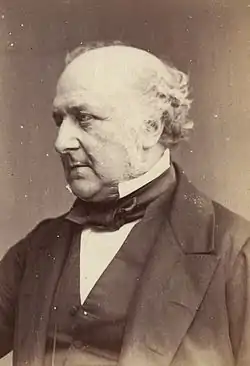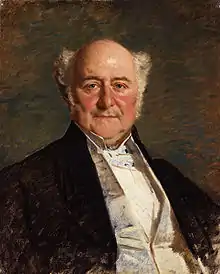Richard Bethell, 1st Baron Westbury
Richard Bethell, 1st Baron Westbury, PC (30 June 1800 – 20 July 1873) was a British lawyer, judge and Liberal politician. He served as Lord High Chancellor of Great Britain between 1861 and 1865. He was knighted in 1852 and raised to the peerage in 1861.[1]
The Lord Westbury | |
|---|---|
 | |
| Lord High Chancellor of Great Britain | |
| In office 26 June 1861 – 7 July 1865 | |
| Monarch | Victoria |
| Prime Minister | The Viscount Palmerston |
| Preceded by | The Lord Campbell |
| Succeeded by | The Lord Cranworth |
| Personal details | |
| Born | 30 June 1800 Bradford on Avon, Wiltshire |
| Died | 20 July 1873 (aged 73) Lancaster Gate, London |
| Nationality | British |
| Political party | Liberal |
| Spouse(s) | Ellinor Abraham
(m. 1823; died 1863)Eleanor Tennant (m. 1873) |
| Alma mater | Wadham College, Oxford |

Background and education
Born at Bradford on Avon, in Wiltshire, he was the eldest son of the physician Richard Bethell of Bristol and Jane (née Baverstock). He was from an old Welsh family originally named Ap Ithel. His younger brother was John Bethell.[2]
He was educated in Bath and Bristol before attending Wadham College, Oxford at only 14 years old. He received a scholarship the next year. He took first-class honors in classics and second class in mathematics, and he graduated as a Bachelor of Arts in 1818 and was elected a fellow of his college.[1][3] In 1823, Bethell was called to the bar at the Middle Temple.[3][4]
Career
Westbury was made a Queen's Counsel in 1840 was appointed vice-chancellor of the County Palatine of Lancaster in 1851.[3] His most important public service was the reform of the then existing mode of legal education, a reform which ensured that students before call to the bar should have at least some acquaintance with the elements of the subject which they were to profess.[1]
In 1847, he ran unsuccessfully for Parliament; contesting Shaftesbury, he lost to Whig politician Richard Brinsley Sheridan.[1] He was successful in his second attempt in 1851, when he was elected for Aylesbury. Attaching himself to the liberals, he became Solicitor General in 1852, on which occasion he was made a Knight Bachelor. He was nominated Attorney-General in 1856 and again in 1859, serving both times for two years. He represented Wolverhampton from 1859–61.[1]
On 26 June 1861, on the death of Lord Campbell, he was appointed Lord Chancellor and raised to the peerage as Baron Westbury, of Westbury, in the County of Wiltshire.[5] Owing to the reception by parliament of reports of committees nominated to consider the circumstances of certain appointments in the Leeds Bankruptcy Court, as well as the granting a pension to a Mr Leonard Edmunds, a clerk in the patent office, and a clerk of the parliaments, the Lord Chancellor felt it incumbent upon him to resign his office, which he accordingly did on 5 July 1865, and was succeeded by Robert Rolfe, 1st Baron Cranworth. After his resignation he continued to take part in the judicial sittings of the House of Lords and the Privy Council until his death. In 1872 he was appointed arbitrator under the European Assurance Society Act 1872.
Character
Perhaps the best known of his decisions was the judgment delivering the opinion of the judicial committee of the privy council in 1863 against the heretical character of certain extracts from the well-known publication Essays and Reviews.
His principal legislative achievements were the passing of the Matrimonial Causes Act 1857, and of the Land Registry Act 1862 (generally known as Lord Westbury's Act), the latter of which in practice proved a failure. What chiefly distinguished Lord Westbury was the possession of a certain sarcastic humour; and numerous are the stories, authentic and apocryphal, of its exercise. In fact, he and Sir William Henry Maule filled a position analogous to that of Sydney Smith, convenient names to whom good things may be attributed.
Family
Lord Westbury married Ellinor Mary, daughter of Robert Abraham, in 1825. His younger brother John married another daughter of Abraham, Louisa Sarah, in 1833.[2] They had four sons and four daughters:
- Ellen (1826–1880)
- Eliza (1828–1916)
- Richard Augustus, 2nd Baron (1830–1875)
- Slingsby (1831–1896)
- Arthur Howard (1833–1834)
- Emma Louisa (1835–1877)
- Augusta (1839–1931)
- Walter John (1842–1907)
After Ellinor Mary's death in March 1863, Richard Bethell married Eleanor Margaret, daughter of Henry Tennant, in January 1873.[4] After an illness, Westbury died six months later on 20 July 1873, within a day of the death of Bishop Samuel Wilberforce, his special antagonist in debate. He was buried in the Great Northern Cemetery (now the New Southgate Cemetery). He was succeeded in the barony by his son from his first marriage, Richard, who committed suicide two years later. Lady Westbury died in December 1894.
References
- "Death of Lord Westbury". The Times. The Times Digital Archive. 21 July 1873. p. 10.
- "John Bethell". Grace's Guide to British Industrial History. Grace's Guide. Retrieved 27 August 2016.
- Dod, Robert P. (1860). The Peerage, Baronetage and Knightage of Great Britain and Ireland. London: Whitaker and Co. p. 117.
- Burke's Genealogical and Heraldic History of the Peerage, Baronetage and Knightage. Burke's Peerage Limited. 1885. pp. 1384–1385.
- "No. 22524". The London Gazette. 28 June 1861. p. 2689.
![]() This article incorporates text from a publication now in the public domain: Chisholm, Hugh, ed. (1911). "Westbury, Richard Bethell, 1st Baron". Encyclopædia Britannica (11th ed.). Cambridge University Press.
This article incorporates text from a publication now in the public domain: Chisholm, Hugh, ed. (1911). "Westbury, Richard Bethell, 1st Baron". Encyclopædia Britannica (11th ed.). Cambridge University Press.
External links
| Wikiquote has quotations related to: Richard Bethell, 1st Baron Westbury |
| Wikimedia Commons has media related to Richard Bethell, 1st Baron Westbury. |
- Richard Bethell, 1st Baron Westbury at Find a Grave
- Works by or about Richard Bethell, 1st Baron Westbury at Internet Archive
- Hansard 1803–2005: contributions in Parliament by Lord Westbury
.svg.png.webp)